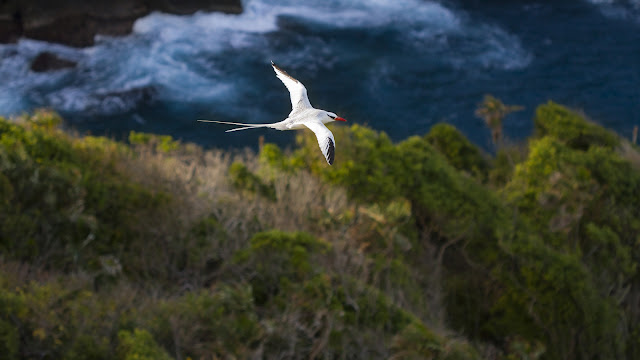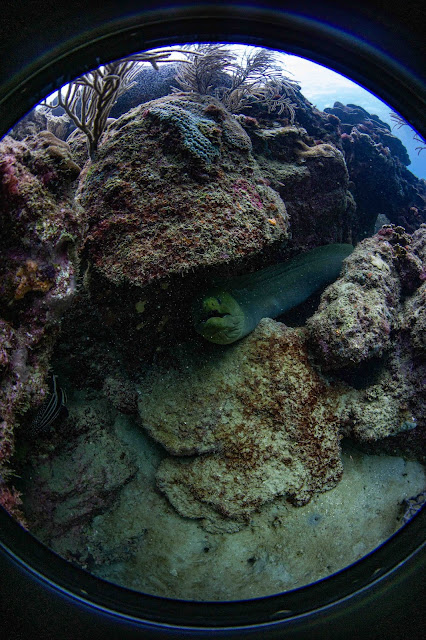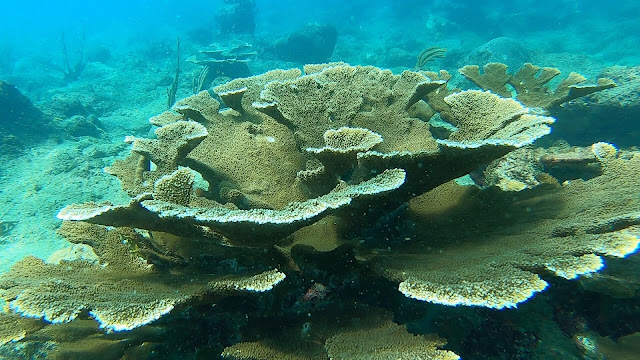One Reef at a Time, in Charlotteville
There’s hope for
coral reefs when people are enlightened and educated. Jahson Alemu, marine
biologist, has reason to believe that Charlotteville Tobago is a community taking
charge of its offshore environment, and can show the way.
Underwater
flowers born out of rock and sand, rebirthing themselves a million times over, coral
reefs have evolved into some of the most resilient and productive ecosystems on
earth. Covering just a tiny fraction (less than one percent) of the earth's
surface and less than two percent of the ocean bottom, they are important
sources of food security, storm protection, livelihoods and medicine to a
conservative estimate of 500 million people on earth. But, I’d be lying to you
if I told you that coral reefs have it easy.
Ever expanding demands for these
resources coupled with warming oceans over the last century have resulted in unprecedented
levels of coral reef losses, well beyond their ability to recover. The
situation is very dire. And even in Tobago, many of our reefs are having
difficulty recovering from past and current stressful events. Ultimately, an
improvement in water quality (reducing nutrients, sediment and pollution
entering the ocean) and reducing greenhouse emissions are necessary to
safeguard the future of coral reefs. But, instead of nursing feelings of despair,
and giving up…
I am optimistic
The reef system
in and around Charlotteville (Speyside too but we’ll save that for another
article) is one of the bright spots of reef resilience for Tobago. Imagine,
expansive reef flats and slopes, overhangs and walls, canyons and tunnels,
covered in massive brain corals and peppered with colourful sponges, sea rods,
sea fans and sea plumes. Hovering over the reefs, interspaced between corals
and within every crack and crevice are a kaleidoscope of fish and invertebrates,
charismatic species such as turtles, rays, eels and sharks that provide good
marketing opportunities for eco-tourism. Also taking advantage of this rich environment
is the lionfish, an alien invasive species and the newest threat to Caribbean
coral reefs, which has taken a stronghold in Charlotteville. But don’t worry,
local divers and fishers are on the hunt for lionfish as part of efforts to
protect the reef. If you’re lucky you might even get lionfish on the menu at
some restaurants.
 |
| Charlotteville the fishing village, photo courtesy Ron Tiah |
Charlotteville
is a small fishing village on the north-east of Tobago, with a rich cultural heritage and unique identity
that I hope continues with future generations. Much of the reef resilience observed
here is as a result of the attitudes of its people. A long history of local
engagement in resource management, sparse urban development, relatively sustainable
fishing, limited coastal pollution and remote access all contribute to better
quality marine resources. On the downside, a burgeoning yacht tourism industry
in this calm and sheltered bay has resulted in increased incidence of anchor
damage on reefs (another threat to coral reefs). Can this type of community-based
self-regulating model be applied or adapted elsewhere in Tobago? I think so and
attempts have been made in the past. It can work. Will it be easy? Likely not.
Such a process
requires continuous dialogue among many different stakeholders until common
ground can be agreed upon, before change can be effected. Fortunately, community
based groups such as Environmental Research Institute of Charlotteville (ERIC),
the North East Sea Turtles (NEST), Environment Tobago (ET) and the Buccoo
Reef Trust (BRT) have been working with and as part of the community to build
local capacity for marine resource management and adaptation to climate change
impacts.
The results of these efforts has been the identification of hotspots
of biodiversity for priority conservation, the temporary installation of
mooring buoy system, coral reef monitoring programmes, coral nursery start-ups,
turtle tagging and monitoring programmes, lionfish culling and first aid
training, but most importantly an engaged community. The process has been slow,
and agents of change within the community have been few. And if my
doctoral research is any indication of the group mind, it’s not that people
don’t care about the environment, or aren’t knowledgeable about its importance
or their role in conserving it, but more pressing social needs (being employed,
providing food to families, poverty alleviation) take priority over
environmental concerns. Perhaps, in Charlotteville the blueprint for change
has been found.
I am optimistic.
 |
| Charlotteville is also learning the value of conserving its coral reefs, photo courtesy Ron Tiah |



